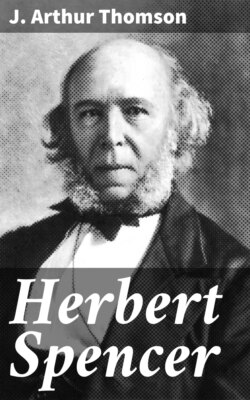Читать книгу Herbert Spencer - J. Arthur Thomson - Страница 3
На сайте Литреса книга снята с продажи.
INTRODUCTION
ОглавлениеTable of Contents
This volume attempts to give a short account of Herbert Spencer's life, an appreciation of his characteristics, and a statement of some of the services he rendered to science. Prominence has been given to his Autobiography, to his Principles of Biology, and to his position as a cosmic evolutionist; but little has been said of his psychology and sociology, which require another volume, or of his ethics and politics, or of his agnosticism—the whetstone of so many critics. Our appreciation of Spencer's services is therefore partial, but it may not for that reason fail in its chief aim, that of illustrating the working of one of the most scientific minds that ever lived, "whose excess of science was almost unscientific."
The story of Spencer's life is neither eventful nor picturesque, but it commands the interest of all who admire faith, courage, and loyalty to an ideal. It is a story of plain living and high thinking, of one who, though vexed by an extremely nervous temperament, was as resolute as a Hebrew prophet in delivering his message. It is the story of a quiet servant of science, indifferent to conventional honours, careless about "getting on," disliking controversy, sensationalism, and noise, trusting to the power of truth alone, that it must prevail.
Another aspect of interest is that Spencer was an arch-heretic, one of the flowers of Nonconformity, against theology and against metaphysics, against monarchy and against molly-coddling legislation, against classical education and against socialism, against war and against Weismann. So that we can hardly picture the man who has not some crow to pick with Spencer.
It is not to be wondered at, then, that we find extraordinary difference of opinion as to the value of the great Dissenter's deliverances. In 1894, Prof. Henry Sidgwick spoke of Herbert Spencer as "our most eminent living philosopher," and in the same sentence described him as "an impressive survival of the drift of thought in the first half of the nineteenth century." Some have likened him to a second Aristotle, while others assure us that the author of the Synthetic Philosophy was not a philosopher at all. Similarly there are scientists who tell us that Spencer may have been a great philosopher, but that he was too much of an a priori thinker to be of great account in science. Many critics, indeed, devote so much time and ability to demonstrating Spencer's incompetence, in this or that field of thought, that the reader is left with the impression that it must be a tower of strength which requires so many assaults. And there are others, neither philosophers nor scientists, who are content to dismiss Spencer with saying that the least in the Kingdom of Heaven is greater than he. Yet this much is conceded by most, that Herbert Spencer was an unusually keen intellectual combatant, who took the evolution-formula into his strong hands as a master-key, and tried (teaching others to try better) to open therewith all the locked doors of the universe—all the immediate, though none of the ultimate, riddles, physical and biological, psychological and ethical, social and religious. And this also is conceded, that his life was signalised by absolute consecration to the pursuit of truth, by magnanimous disinterestedness as to rewards, by a resolute struggle against almost overwhelming difficulties, and by an entire fearlessness in delivering the message which he believed the Unknown had given him for the good of the world. In an age of specialism he held up the banner of the Unity of Science, and he actually completed, so far as he could complete, the great task of his life—greater than most men have even dreamed of—that of applying the evolution-formula to everything knowable. He influenced thought so largely, he inspired so many disciples, he left so many enduring works—enduring as seed-plots, if not also as achievements—that his death, writ large, was immortality.
